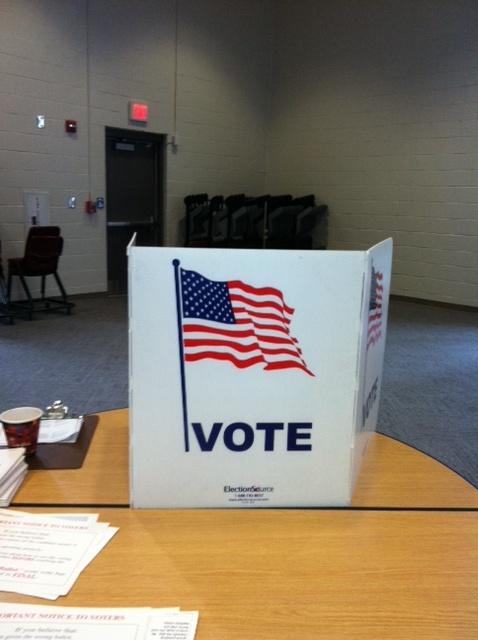
Caption
The state is appealing a judge’s temporary ruling that blocked parts of Senate Bill 202 ahead of the 2024 presidential election.

The state is appealing a judge’s temporary ruling that blocked parts of Senate Bill 202 ahead of the 2024 presidential election.
The U.S. Court of Appeals for the 11th Circuit will determine whether to continue blocking provisions of Georgia’s 2021 election law overhaul that civil rights groups say discriminates against Black and disabled voters.
The Georgia Republican Party and national GOP political committees are backing state officials in their request that the appellate court overturn the Aug. 18 decision of District Judge J.P. Boulee, who granted preliminary injunctions on voting rules connected to the controversial Republican-backed Senate Bill 202 that passed in the wake of the 2020 presidential election.
The attorney general’s office filed an appeal with the Atlanta-based circuit court on Sept. 18.
Boulee’s temporary order makes it legal, for now, for food and water to be given out to voters as long as they are not within 150 feet of a polling place. Additionally, it rejects SB 202’s requirement that an absentee ballot with an incorrect birth date on the outer envelope is automatically rejected by the county clerk.
Boulee, however, declined the plaintiffs’ request to suspend provisions limiting absentee drop boxes access and who can assist voters with returning mail-in ballots.
The state is appealing Boulee’s injunction on the two rules that as of now would be in place for the 2024 election.
A daylong evidentiary hearing in Boulee’s courtroom was held on Friday between attorneys for plaintiffs and defendants.

The state is appealing a judge’s temporary ruling that blocked parts of SB 202 ahead of the 2024 presidential election.
Special Assistant Attorney General Gene Schaerr said that the plaintiffs are trying to rehash old arguments that Republican lawmakers were discriminatory when they passed a bill that they argue better regulates how elections operate statewide.
“Granting this motion this close to election would create some confusion and doubt that SB 202 was trying to resolve,” Schaerr said in court. “The only way you can grant any relief on this motion is for the court to find that the majority in the General Assembly is racist.”
This lawsuit is the consolidation of several legal complaints filed after the voting bill was signed into law in 2021.
Among the plaintiffs in Kemp v. Sixth District of the American Methodist Episcopal Church are Delta Sigma Theta Sorority, Georgia Muslim Voter Project, Georgia Advocacy Office, which works on behalf of people dealing with disabilities, and several other organizations.
According to the state’s attorneys, Georgia has maintained strong voting laws through, for example, automatic voter registration. They say SB 202 established an additional mandatory day of early voting and offered a number of safeguards to keep voters from waiting in long lines. In addition, state lawyers argue that absentee ballot rules simply protect the integrity of elections by providing another layer of transparency.
But the groups challenging SB 202 say the law is more likely to turn away Black and disabled voters on Election Day due to a rule prohibiting out-of-precinct voting unless it’s within two hours of polls closing.
Boulee said in his Aug. 18 order that an outright ban on the distribution of food and beverages to voters in line may infringe on the First Amendment.
SB 202 also requires absentee voters to provide their Social Security number and driver’s license or state identification card.
“The court is simply not persuaded that eliminating the birth date requirement risks introducing fraudulent ballots or threatens election integrity,” Boulee wrote in the order last month.
During Friday’s court hearing, Augusta Democratic state Sen. Harold Jones, a member of the Senate Ethics Committee that takes up election bills, testified on behalf of the plaintiffs.
The drop boxes must now be located inside supervised buildings and are only accessible only during early voting business hours.
In 2020, state election officials adopted an emergency rule allowing voters to deposit their mail-in ballots into containers that were available around the clock. SB 202 is the first time that absentee drop boxes became a permanent rule.
“It was good to require every county to have absentee ballot drop boxes, but there is no reason for us in (the Legislature) to limit how many a county can provide,” Jones said.
Jones was asked by a defense attorney if he believes that his Republican colleagues who supported the 2021 election law overhaul were racist.
Jones said his fellow GOP lawmakers were trying to solve a number of nonexistent problems based on disappointing 2020 election results when Democratic challengers upset incumbents Trump and U.S. Sens. Kelly Loeffler and David Perdue.
“There was no real issue with absentee ballots until a Democrat who substantially relied on African-American (absentee) votes won,” Jones said.
Lawyers on both sides are using election experts who have analyzed voter turnout trends since the new election law took effect, comparing more recent results to the previous two statewide elections.
Since the 2014 and 2018 elections, the white voter base in Georgia has shrunk, said Barry Burden, a professor of political science at the University of Wisconsin-Madison, who testified for the plaintiffs on Friday.
He also pointed out the “racial polarization” of elections in which Black voters tend to vote for Democratic candidates by 70% or more, yet socioeconomic disparities between Blacks and whites in Georgia affect their likelihood of voting. According to Burden, new election rules that add more obstacles decrease the chance of Black voters exercising their right to vote.
Black voters in the 2020 and 2022 elections were more likely to vote absentee and return their ballots through drop boxes, Burden testified on Friday.
He also estimated there were about 100 fewer drop boxes available in 2022, which contributed to the drop box usage declining by 50% compared to the 2020 presidential election.
The state’s political science expert disputed claims that Black voters used drop boxes at a higher rate than white voters in 2022. The defense expert and state election officials also say that last year’s midterm was a record turnout in Georgia.
This story comes to GPB through a reporting partnership with Georgia Recorder.